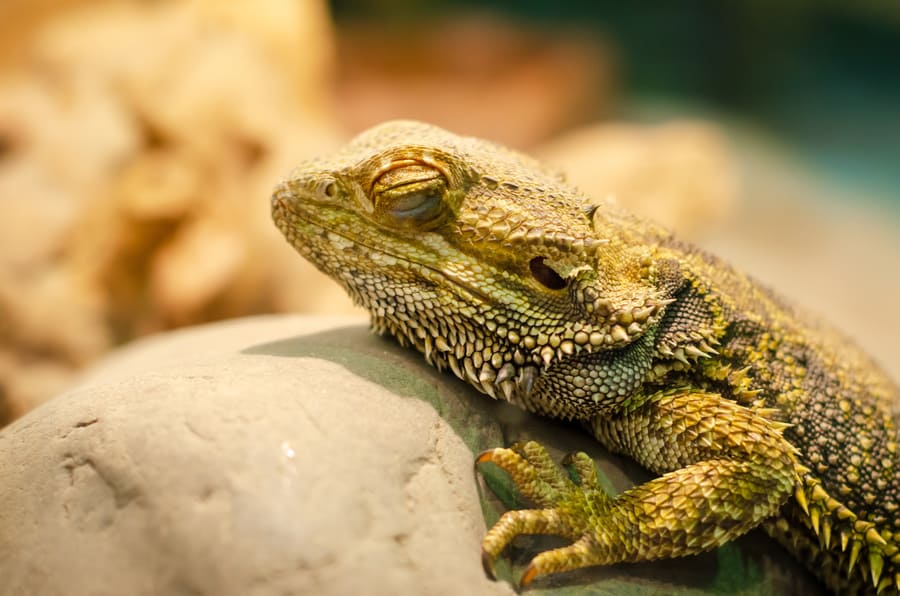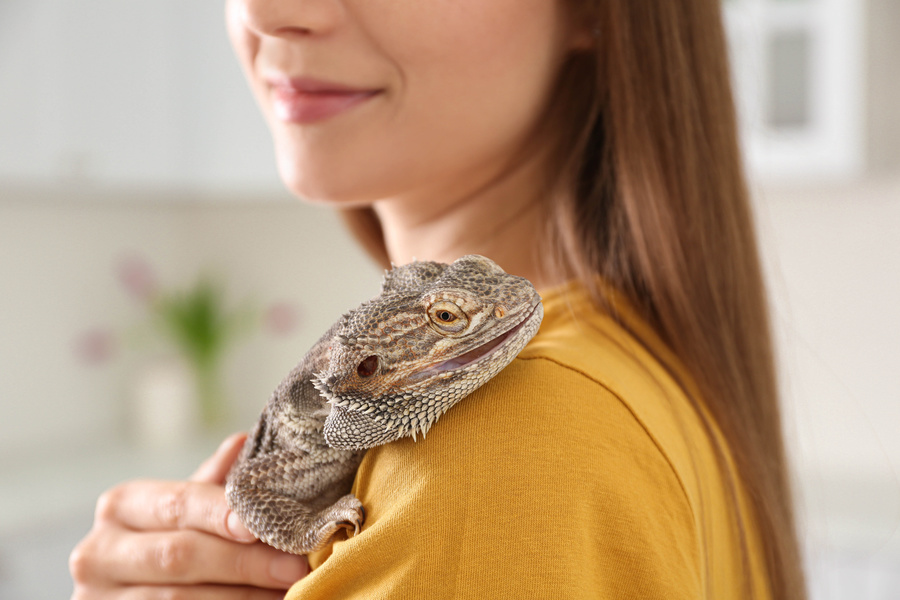
As a new or experienced bearded dragon owner, you may notice your pet taking random or even regular naps during the day. Oftentimes this seems natural but you may be wondering if your pet bearded dragon is tired for negative reasons. Should you be concerned and why do beardies nap?
Bearded dragons will nap during the day because of brumation, the room is too dark and it mimics nighttime conditions, or it could be a sign of illness. Bearded dragons should get ample sleep at night so daytime napping should be limited if at all possible to prevent sleep cycle interruptions.
In this article, we will really dive deep into the nature of healthy bearded dragon sleep and explain what unhealthy sleep looks like. Additionally, we will show you that not all napping is bad but it can tell you important clues about the comfort and condition of your lizard.
Do Bearded Dragons Take Naps?
Bearded dragons take naps during the day. It is your role as their owner to make sure they do not sleep too much during the day. They can mess up their sleeping habits just like we can.
Bearded dragons take naps for several reasons. Sometimes it is because a sudden drop in temperature has them thinking it is time for them to go into brumation. Other times it is an illness or simply because the room is too dark.
Bearded dragons do not hibernate as they do not go into complete bodily shutdown. Instead, they go into brumation. With brumation their body slows down, they do not eat or drink as much and their movements are much slower.
Bearded Dragons & Sleep
Bearded dragons can sleep in the dark. That is the preferred time of sleep. To get them sleeping most at night and little if any during the day you have to make sure your room is light during the day and dark at night.
Bearded dragons are diurnal. Diurnal means being active during the day whereas nocturnal means being active at night. Bearded dragons are naturally most active during the daytime.
Midday napping is no cause for concern as the average bearded dragon sleeps for 8 to 12 hours per day. The only time you should be concerned is if he is sleeping more than 12 hours.
The average bearded dragon should sleep 8 to 12 hours per day. This provides enough sleep at night plus a brief nap or two. If they sleep too long during the day, they will be awake at night and will mess up their sleep schedule.
Your bearded dragon should be sleeping 8 to 12 hours per day. Use lighting and room darkening equipment to make the room dark at night and as light during the day as possible. This will help keep your bearded dragon’s sleep schedule regular.
For a healthy sleep pattern, the bearded dragon likes to sleep in the dark, just like we do. Total sleep in any 24 hours should be no more than 12 hours. Fix your room so it is dark at night and bright during the day. Use black-out drapes at night and open them during the daytime to help fix a bearded dragon’s sleeping schedule.
Seasonality can play a big factor in the sleeping patterns of bearded dragons. When a bearded dragon perceives it is winter, he will slow down and enter brumation. Bearded dragons in captivity do not need to enter brumation as long as you keep their environment warm enough. If it is cold he will enter brumation, but if it is warm he will only sleep 8 to 12 hours per day.
Reasons Your Bearded Dragon is Sleeping so Much
Perhaps your bearded dragon is in or going into brumation. Bearded dragons like to sleep when it is dark. If you have room darkening curtains and the light is off, they will sleep. Try leaving a light on so that they realize it is daytime.
Reptiles need it to be warm to function. If it is freezing they will sleep. If your bearded dragon is not getting enough food to eat, they will go into brumation. When there is not enough food in the wild, it is a sign to the animals that the seasons are changing and that winter is right around the corner.
While they might be getting enough to eat, if the bearded dragon’s diet does not consist of the correct ratio of protein to greens, their system will shut down. Young bearded dragons need more protein than greens, while adults need only 20% protein and the rest greens. Also, stay away from iceberg lettuce, cabbage, and spinach. Instead, go for mustard greens and red leaf lettuce.
Just like our sleep cycle can get messed up, so can the bearded dragon. Slowly fix it using the lamp for daytime. Wake him up during the day so that he will sleep at night.
Young lizards are always tired and will use every opportunity they can to sleep. Make sure your room is pleasurable and bright during the day and dark at night so that they will develop a regular sleeping schedule.
If your bearded dragon appears lethargic and their feces appear to be extra stinky, they may be stressed out about something. Stress causes your bearded dragon to sleep. Stress could be anything from a change in diet to noise outside.
Maybe they are having difficulty getting used to their new home. Perhaps you upgraded them to a larger model aquarium and now they are stressed out. This is causing them to sleep more. Help them get used to it by bringing in familiar toys.
If you notice your beardie’s skin changing color and shedding when it’s not time, your beardie may be ill. Other symptoms of the illness include refusal of food or water; joints that are swollen; or a runny nose.

Waking a Bearded Dragon from Sleep
A bearded dragon should be woken up if he has slept for more than 12 hours. Do not wake him up if it is at night, let him sleep. If he is sleeping too much during the day, then wake him up.
It is not harmful to wake up a bearded dragon who is sleeping. You may have to wake him up to clean up his cage or to feed him. Regardless, if he is sleeping too much, it is time to wake him up. Fix his sleeping schedule to put it in line with yours. This will give you more opportunities to interact with him.
How to Pick Up a Sleeping Bearded Dragon
Regardless of if you are picking up a bearded dragon who is sleeping or awake, the first step is always to wash your hands with soap and water. You do this to prevent the spread of bacteria from your hands to the reptile and vice versa. Do not pick up a beardie hiding or eating.
Carefully approach the bearded dragon so that you do not frighten him. Also, if you move your fingers around he may think they are worms and will try to bite you. Approach from the direct line of sight, not from the side as your beardie will only see shadows and will get scared. He may even try to run away.
From the front, take your hand and scoop under the bearded dragon. Be sure that you are supporting the entire bearded dragon. If it is a large bearded dragon, you may need to use two hands to properly support him.
Brumation & Napping
Brumation and napping are two different things. When your bearded dragon naps, all bodily functions are still working at 100%. When your bearded dragon has entered brumation, the body slows down, but they are still able to move around the aquarium. This is unlike hibernation where the animal is unable to move and is in a deep sleep.
What Does it Mean if a Bearded Dragon Falls Asleep on You?
Do not be concerned if your bearded dragon falls asleep on you. This is a sign that your bearded dragon is fond of you. It also means they trust you. Of course, it could be that they are sleeping because they enjoy your warmth too.
When We Should Be Concerned in terms of Sleeping Patterns in a Bearded Dragon?
Bearded dragons should sleep up to 12 hours per day. If they are sleeping less than 8 hours or more than 12 hours a day, then there may be a cause for concern. Check the bearded dragon to determine if there are any symptoms of an illness. Is the skin color normal? Do the feces smell worse than normal? These are signs that your bearded dragon is ill.
What if my Baby Bearded Dragon Naps All Day?
It is normal for a baby bearded dragon to sleep many hours a day. They have the same sleeping requirement as an adult which is 8 to 12 hours per day. A baby bearded dragon will sleep more if it is chilly. He will also sleep many hours if he is stressed out. The important thing is to regulate all aspects of the bearded dragon’s life.
Make sure it is warm enough in the bearded dragon enclosure. Feed the baby on a regular schedule. Wake the baby up if he is sleeping more than 12 hours per day. Make sure he is not awake all night and is consequently sleeping during the day. Check for signs of illness. A stressed-out adult will stay in one place and will sleep. Ensure the proper died is being fed. A baby needs more protein than greens. If their diet is not in the correct proportion, they will appear lethargic.
